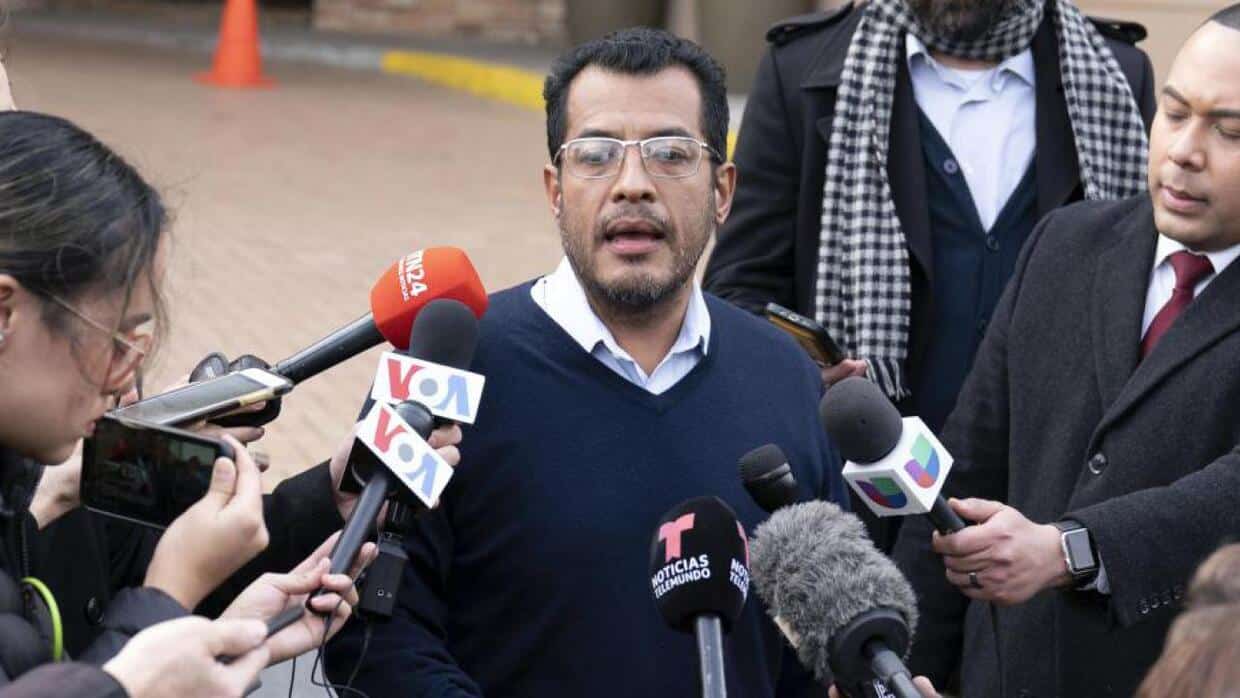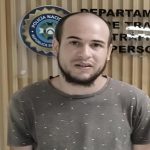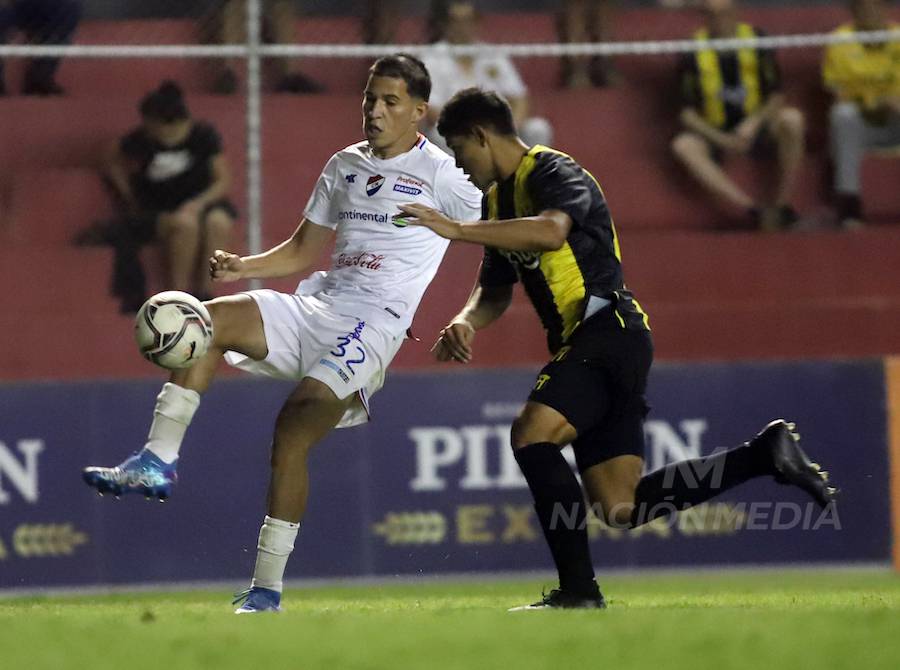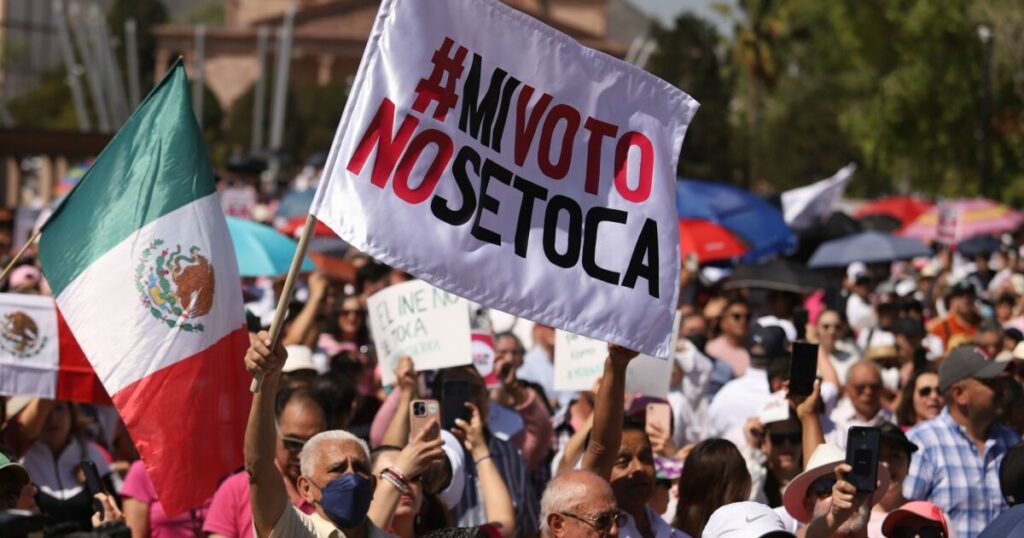Félix Maradiaga, former presidential candidate and released political prisoner, he never imagined being expelled from his own country and does not recognize the “arbitrary and unconstitutional” decision of the regime of Daniel Ortega and Rosario Murillo, to strip him of his Nicaraguan nationality and exile him to the United States.
Maradiaga, who spent 611 days in the El Chipote prison, assured that he will continue the fight for a “free and fair” Nicaragua. despite the difficulties of exile.
During an interview for the show Tonight and CONFIDENTIALwas “optimistic” about the future of the pro-democracy movement in Nicaragua, although he acknowledged that a “bad job” has been done to “communicate the internal efforts for unity.”
“Probably towards the outside, the political leaders have not been able to communicate that there is great cordiality between us, a great friendship,” said the released political prisoner.
On June 8, 2021, you were arrested by the Police, after leaving an appointment at the Prosecutor’s Office, was it possible to avoid that arrest?
That detention was almost inevitable, because since 2020 he had already spent a few months under house arrest, so the next step was jail. But it was necessary, even that step, to maintain our fight for a free and democratic Nicaragua.
You were a political prisoner of the dictatorship for more than 600 days, what were your conditions in El Chipote?
In El Chipote there were 611 days. The first 84 days in total isolation, in the sense that I had no access to a phone call, to a lawyer, to a family visit, so the first 84 days were like the desert.
The first months were very difficult, but I found in my faith, I must say it with all transparency, my refuge. At no time did I feel alone. I knew that outside, my wife was doing an extraordinary job pushing for the release of all political prisoners together with Vicky Cárdenas, wife of Juan Sebastián Chamorro. The darkness, the lack of human contact, the prohibition that we could talk, we were never allowed any reading material, even, I mention this because it seems so extreme to me, when the family began to bring bottles of milk, the labels were torn off so we couldn’t even read.
Did you ever think that your release along with that of more than 200 political prisoners was going to be the way it happened?
Despite the fact that the conditions of the family visit were very extreme and no type of free exchange was allowed, neither of letters nor of data, I received information from my wife through a relative more than a year ago. that she told me that it was possible that they would extradite us and that they were going to put a document that I had to sign, and she asked me not to reject the document out of love for our daughter, and that it was probable that I would try not to board the plane. That is why she made me swear to her, through that relative, that if that scenario occurred, I was going to get on that plane, and I gave her my word, but I never managed to relate it to the possibility that we could go out that way.
What were they accusing you of during the interrogations? Did they tell you why you were detained? Was any evidence presented to you at the mock trial? The trial took place inside the El Chipote facilities and the interrogations that were maintained for long months, I calculate were probably more than 400 interrogations, the questions, some of them bordering on the irrational, I would even say clumsy. For example, they asked me, how much did we pay the people from the marches? Who were my financiers for the attempted coup?
Some questions truly out of all sense, but at some point also other very suspicious questions, which without being subject to any truth indicated what came later. For example, they told me that I was a mercenary, that my international advocacy before the United Nations Security Council, my trips to Geneva to denounce the cases in Nicaragua, were clearly actions of a foreign agent and that I was going to be treated and tried not as a Nicaraguan, but as a traitor.
You were incommunicado with your wife and daughter for almost the entire time you were in El Chipote. How did you experience the family reunion?
It has been something magical. I really have a great weight in my heart, for having boarded that plane and having returned to Nicaragua, knowing that my daughter and my wife were staying here (United States). But, it was the morally right thing to do.
I was not allowed (in jail) not even a drawing of Alejandra, I was not promised any calls, except a few weeks before we left. This family reunification has forced me to give new meaning emotionally and spiritually to the importance of family in this new phase of my life. I’m giving it as much time as possible.
A Nicaragua for all
Now that the political leadership of the Nicaraguan opposition is free, what is your vision of the future?
I am a permanent optimist. My vision of the future of Nicaragua has always been one of great hope. I think that it will not be so fast, that it will still require a lot of sacrifice. I am committed, for the rest of my life, to seeing a free, just Nicaragua, where the children of my own jailers, the children of those who beat us, tortured us, of those who at some point They have supported the regime. I think we have to break that cycle once and for all.
What did the opposition leaders learn in prison?
I could see in all of them a great firmness. We learned to see humanity and dignity even in the jailer. We responded to an insult with cordiality, to an offense we responded with serenity, and I could see in the jailers a bewilderment as to how it was possible that these people who had painted them as “monsters”, “terrorists”, “coup plotters”, in At all times, as if we had coordinated, we always spoke from tolerance.
Probably towards the outside, we political leaders have not been able to communicate that there is a great friendship between us. I always thought or wondered why an alleged fragmentation of the opposition was being reported, when within the leadership there was always a lot of cordiality, at least among the majority of us. We are doing a very poor job of communicating the internal efforts of unity. Not only to strengthen ourselves internally, but to give the Nicaraguan citizens the certainty —from authenticity, from frankness— that only united can we dismantle this dictatorship.
How do you see the future of the pro-democracy movement in the country?
I don’t claim to have all the answers. I am talking to as many people as I can, but I have also wanted to give space to emerging leaders, those leaders so brave that, in our absence, they took the lead and suffered exile, release from prison. I am optimistic, but I think there are still many things to do. It seems to me that the part where you have to spend more time is uniting an opposition platform.
What do you think are the next steps in the struggle to achieve that cohesion that you mention? Can the opposition do politics from exile, exiled from the country and under a police state?
I suffered exile in the 80s and learned to know the enormous value that diasporas have in building democracy. In periods of crisis, unfortunately, a significant number of people leave the country who have a lot to contribute and who generally do so because they are forced to whatHow do the leaders that have been exiled and arbitrarily stripped of our nationality coordinate with the leaders that still exist within Nicaraguan territory, but do so practically anonymously? I think that is yet to be defined, but I do believe that it will be possible.
Fifth anniversary of the April Rebellion
How do you see the future of the dictatorship? Can a dynasty be planted in Nicaragua?
The future of the dictatorship is inevitably linked to its collapse, because it has absolutely no plan that is beneficial to Nicaraguans, not even its followers. SIts same structural problems are also going to be a problem for its own internal implosion.
The problem is how we generate an alternative (as opposed to) a dictatorship that is going to collapse at some point. There is the possibility that this dictatorship survives and can mutate into a kind of Cuban regime, a Korean regime.
In a month and a half the fifth anniversary of the April rebellion is celebrated. whatWhere are the young university students who ignited the call for the national protest?
They continue to fight from their new trenches. A few years have passed, many have gone through difficult times, been imprisoned, lost their close friends to the murders, and have also been forced into exile.
It seems impressive to me that these leaders have great resilience, obviously no longer as university students, because we all know how the university leadership within Nicaragua has been dismantled with the atrocious persecution within the universities, but I have great hopes, because the young people they took the lead and are the hope of the country. They are not the future, they are the present.
What is needed to unify a strategy in the fight to get out of the dictatorship of Daniel Ortega and Rosario Murillo?
We have to transcend beyond the ideological and partisan borders that have divided Nicaraguans for many years. and particularly the leaders. I recognize that there are thousands and thousands of Sandinistas who do not identify with Ortega. We have to transcend those walls and understand that this is a fight for democracy against dictatorship. This is not a matter of Sandinismo and anti-Sandinismo, and at the moment when this approach is truly cohesive, that all of us who believe in human rights and who believe in democracy must be unified, all of us who do not join that platform of democracy and that they are endorsing the dictatorship, they really have to be on the dark side. The side of light is the side of human dignity, which is the side with which we are going to defeat the dictatorship.


















